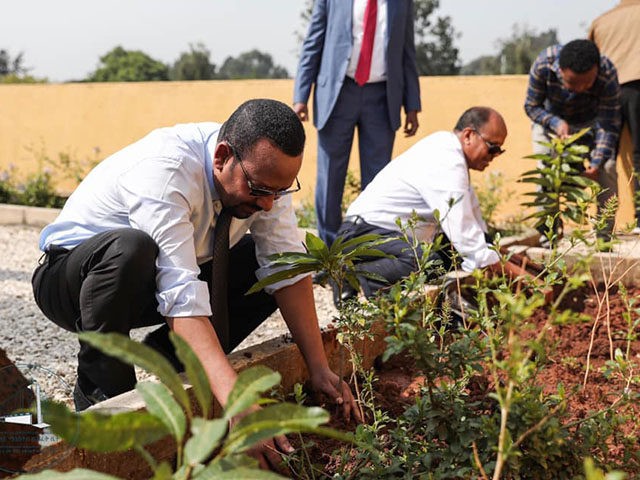Ethiopia may have set a world record by planting 350 million trees in 12 hours on Monday as part of its plan to fight climate change and deforestation.
The effort is part of Prime Minister Abiy Ahmed’s “Green Legacy” campaign to plant four billion trees between May and October this year to restore Ethiopia’s landscape.
“Today Ethiopia is set in our attempt to break the world record together for a green legacy,” the prime minister’s office wrote on Twitter Monday morning.
Reports state that the “campaign wants every Ethiopian to plant 40 seedlings during the rainy season, which runs from May to October. In the end, the country will have 4 billion indigenous trees to help mitigate the effects of the global climate crisis.”
India currently holds the world record for the most trees planted in a single day after 800,000 volunteers planted more than 50 million trees in 2016, the BBC reports.
Bus driver Bekele Benti told reporters his work allows him to see the effects of deforestation all over the Ethiopian countryside.
“As a bus driver, with frequent trips across the country, I have witnessed the extent of deforestation in different parts of Ethiopia. It’s really frustrating to see forest-covered areas turned to be bare lands within a few years,” he said.
The website for the office of the prime minister says the campaign is a way to get the public involved in solving environmental problems.
“#GreenLegacy, is an ambitious undertaking to become a green society by planting various types of eco-friendly seedling to combat environmental degradation and, a national platform that will be used for various societal green activities,” the website says.
Critics argue that the prime minister is using the campaign to distract from ongoing ethnic conflicts, which have reportedly forced millions of people from their homes.
“Since Abiy Ahmed was inaugurated as Prime Minister in April 2018, the borders between these ethnic regions have experienced multiple deadly clashes,” Deutsche Welle reported.
However, Human Rights Watch said in April that the country had recently experienced significant changes under Abiy’s leadership when it came to freedom of speech and the press.
“When Human Rights Watch visited the country in February, people were speaking very openly about sensitive subjects in public spaces, cafes, and mini buses, which is a marked change from a country once consumed by fears of monitoring and surveillance,” the report said.

COMMENTS
Please let us know if you're having issues with commenting.